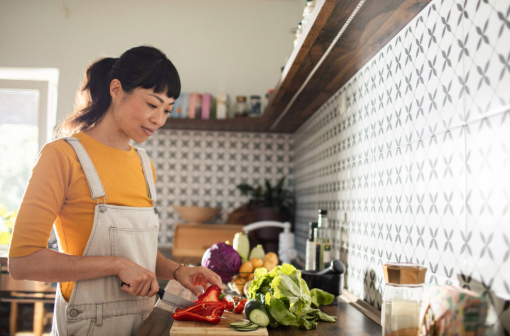“If you never expose yourself to something—for example, going out to catch up with friends—you'll never see that, despite your anxiety, you can cope, and actually have a positive and enriching experience.”—Georgia Maling, MindStep® Mental Health Coach, Remedy Healthcare
Key points
- Australian Unity Wellbeing Index research found that our social connectedness scores fell during the early days of the pandemic, but had begun to recover in 2021.
- After a prolonged period of social isolation, you may need to practice doing the things that once came so naturally, like heading out to dinner with friends.
- If you’re having trouble reconnecting, start small and build up from there. Remember: Rome wasn’t built in a day, so be kind to yourself.
Sharing a laugh with an old friend over coffee and cake. Celebrating a milestone birthday with a family dinner. Toasting a colleague’s retirement with a couple of drinks in a pub garden. These are just a few of the life-affirming occasions that Australians were denied in the dark days of COVID-19.
One of the pandemic’s sneakiest and most insidious effects was the way it undermined many of our personal connections, with lockdowns and other restrictions inevitably taking their toll on our social interactions. In fact, the Australian Unity Wellbeing Index—a 20-year study into the wellbeing of Australians, created in partnership with Deakin University—found that the nation’s social connectedness scores fell significantly in 2020 during the peak of COVID restrictions, then started to recover in 2021 as we began to live with the new COVID-normal.
Why connection matters
Australian Unity Wellbeing Index lead researcher, Dr Kate Lycett, from Deakin University’s School of Psychology admits that our social connectedness certainly suffered during the first two years of the pandemic.
She points out that certain groups endured a significantly tougher time, with the pandemic proving a particular ordeal for young adults who had the lowest levels of social connectedness. “If you’re a 20-year-old, your social connections are often based around going to a gig, a sporting event, a party, or a pub—those types of things,” says Kate. “So I think that group just did it so hard. At that age in your life, those bigger social connections are just so important.”
It's a point echoed by Australian Unity Wellbeing Index findings that showed high levels of mental distress were more common during the pandemic in those aged under 35 years. And yet, whatever your age, the research reinforced the importance of relationships to our overall wellbeing: people with greater social connectedness were found to enjoy markedly higher personal wellbeing scores than those without.

Flexing our social muscles
Australian Unity Wellbeing Index research has consistently shown that our personal relationships form part of the “golden triangle of happiness”, sitting alongside our standard of living (finances) and achieving in life (sense of purpose). Humans, after all, are social animals. We count on our nearest and dearest to support and sustain us through life.
While the value of these connections is indisputable, many of us found that our social skills got a little rusty over the past couple of years. “A lot of people are probably in the same boat,” says Georgia Maling, a coach for mental health program MindStep®, which is delivered by Australian Unity’s health partners Remedy Healthcare.
“We've probably lost touch with a few people. Our world became a lot smaller during COVID and was often contained to just our household or our family. So it takes some time to feel comfortable to branch out again.”
If you haven’t been in contact with someone for a while it may feel awkward, even overwhelming, to start to rekindle that connection. If you’re unsure about how to bridge the gap, Georgia suggests that writing a letter can be a powerful way to reopen contact with someone.
“Or it could just be a call or a quick message—something simple just to say, ‘I'm thinking about you’ or ‘I miss you’. It might not even have any obligation to catch up, but just to note that you care, and that you value that person in your life.”

Getting back out there
For the less extroverted among us, prolonged isolation can sometimes fuel social anxiety. But cognitive behavioural therapy can help people to overcome such fears.
“One of the research- and evidence-based practices for anxiety that I've seen work to a great effect with my own clients is something called graded exposure,” says Georgia. “For a lot of people, it's that first effort that may stop them from going out. And those first few times might be a bit harder, a bit more draining and cause some extra social anxiety.
“But if you never expose yourself to something—for example, going out to catch up with friends—you'll never see that, despite your anxiety, you can cope, and actually have a positive and enriching experience.”
Another piece of advice if you are feeling a little timid? Start small and gradually build up. If you’d been inactive for a long time, for example, you wouldn’t start your fitness regimen by running a marathon. So rather than hurl yourself straight into a big social gathering, take it step by step. You could start off by having one or two people over to your dinner. The next time, you could suggest having dinner out, then progressing to having dinner and drinks on the following occasion.
“Essentially, you’re slowly working your way up to where you want to be, rather than just throwing yourself back in the deep end and expecting great things,” says Georgia.
Truth be told, after months of social isolation and endless Zoom calls, we’re all a little out of practice at socialising. It’s perfectly understandable if you feel a little daunted about mingling and meeting new people, but avoiding those situations will only exacerbate your anxiety, says Georgia.
“Just have a bit of kindness for yourself and remind yourself that two or three years have passed, and this is a muscle we haven't used in quite a while.”

Disclaimer:
Information provided in this article is not medical advice and you should consult with your healthcare practitioner. Australian Unity accepts no responsibility for the accuracy of any of the opinions, advice, representations or information contained in this publication. Readers should rely on their own advice and enquiries in making decisions affecting their own health, wellbeing or interest.
Remedy Healthcare Group Pty Limited and Australian Unity Health Limited are wholly owned subsidiaries of Australian Unity Limited.
An Australian Unity health partner, Remedy Healthcare provides targeted, solution-oriented healthcare that is based on clinically proven techniques. For more than 10 years, Remedy Healthcare has worked with more than 100,000 Australians – helping them to manage their health through caring, coaching, empowerment and support.


